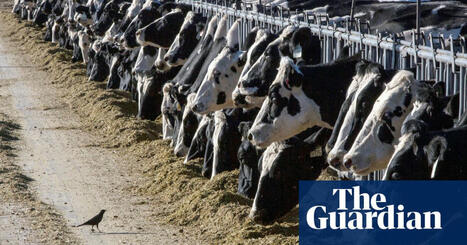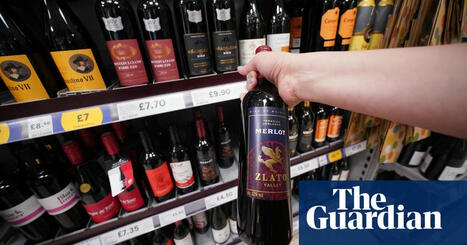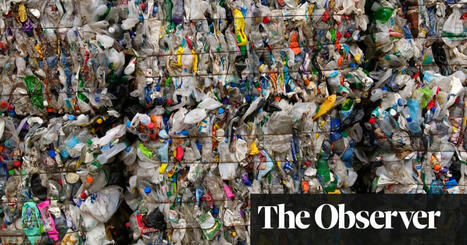The scheme has faced resistance, including from President-elect Donald Trump.
Get Started for FREE
Sign up with Facebook Sign up with X
I don't have a Facebook or a X account

 Your new post is loading... Your new post is loading...
 Your new post is loading... Your new post is loading...
The government says reforms will reduce gambling-related harm and raise funds to treat addiction.
Graham Watson's insight:
The government is stepping in to tighten the regulation of fixed odds betting terminals (FOBTs) by limiting the amount that can be wagered to £5 for over-25s and £2 for 18 to 24 year olds - although how that's going to be monitored is anyone's guess.
However, the idea is that by limiting the stakes on these machines, there should be fewer negative externalities generated by problem gambling, something that's also being addressed by a new gambling levy.
Visitors might pay a charge when staying overnight in Wales under plans to be outlined later.
Graham Watson's insight:
The idea of a tourism tax has been adopted in a number of European cities, and now it looks like it might be coming to Wales. It seems to make economic sense, in as much as tourists use local amenities and as economists that should be something that they pay for. In addition, in popular destinations, it's also the case that tourism generates negative externalities, and again this would imply that a tax is justifiable.
Gambling Commission figures show shock rise to 85,000 in number of young people suffering gambling harms
Graham Watson's insight:
What a day for those of a puritanical persuasion: another negative externalities story. This time Gambling Commission data suggests that the number of young people harmed by gambling addictions have risen to 85,000, or 1.5% of children.
So what's the solution? Another good question for discussion, and evaluation. g
Health and children’s groups urge UK ministers to impose levies on products containing too much salt or sugar
Graham Watson's insight:
One to set libertarians teeth on edge: campaigners are calling for the taxing of unhealthy foods to tackle obesity which, superficially, looks like a good thing right? Clearly the over-consumption of certain types of foods generates negative externalities.
However, there are a number of problems with this: in the first place, who defines what is an "unhealthy food" - many ostensibly "healthy" items, such as cereal bars are, on closer inspection, less than healthy. Then, there's the issue of "over-consumption": why should someone with an extremely healthy lifestyle be denied the occasional pleasure? And would we want to tax things like birthday cakes?
So, whilst obesity generates negative externalities, simply taxing certain products might not represent good economics.
Global efforts to tackle climate change are wildly off track, the UN has said, as new data shows that warming gases are accumulating faster than at any time in human existence. The update came as a separate report showed that greenhouse gases have risen by over 11% in the last two decades, with atmospheric concentrations surging in 2023.
Graham Watson's insight:
This BBC World clip highlights recent data released that suggests that there's a singular failure to achieve our climate change targets, with the concentrations of greenhouse gases in the atmosphere rising, and there also being some suggestion that the world's forests are losing their ability to soak up carbon.
Anti-waste charity Wrap wants ban on 21 items including tomatoes, apples, potatoes, bananas and carrots
Graham Watson's insight:
Anti-waste charity, Wrap, is calling for legislation banning plastic packaging being used on 21 grocery items, to reduce the amount of plastic waste generated by the sector.
It's noticeable that we are far worse than continental Europe in packaging these items; according to the article "in 2022 an average of 19.4% of fresh produce sales was loose, with the proportion by retailer varying from 2% to 30%. By comparison, in mainland Europe it is 50%." So any reduction in this is likely to help reduce the negative externalities associated with plastic waste.
That said, you should also note that this is a net effect - rather than a simple welfare gain: "Plastic packaging had resulted in less store waste, simpler production lines and tidier shelves".
Rachel Reeves urged to levy ‘double whammy’ on firms’ £1bn annual profits to fund measures to end smoking
Graham Watson's insight:
The anti-tobacco lobby is calling for the government to introduce further measures to tackle the negative externalities associated with smoking, in this case a windfall tax on tobacco firms and a levy on the profits of the industry. As is often the case they're recommending that the tax revenues be hypothecated for the healthcare issues that smoking generates.
Health leaders tell government to follow Scotland and Wales on cost of cheap booze after Darzi report on death toll
Graham Watson's insight:
The Darzi report into the state of the NHS has highlighted an increase in the amount of alcohol-related illness. Consequently, there are calls for the government to introduce a minimum price for alcohol to reduce consumption, as has been done in Scotland and Wales.
The empirical evidence from Scotland suggests that the measure has reduced alcohol-related deaths, and as the article notes "the Institute of Alcohol Studies put the cost of alcohol harm in England at £27.4bn, with a cost to healthcare of £4.91bn. It said alcohol tax revenue raises just £12.5bn a year."
MRU explains negative externalities with a real-world example: overuse of antibiotics leading to the evolution of “superbugs.” Antibiotic users benefit from the drugs, while society at large bears the added cost (and risk) of increased antibiotic resistance leading to hard-to-treat infections.
Graham Watson's insight:
This MRU looks at the negative externalities associated with the overuse of antibiotics, something they originally looked at nearly a decade ago.
It's a clear explanation of how negative externalities arise because of the divergence between marginal social cost and marginal private cost, which results in the over-consumption of antibiotics
Cost of soft drinks, beer and kettles likely to increase as a result of scheme that shifts recycling fees to manufacturers
Graham Watson's insight:
At face value, a tax on packaging is likely to reduce the negative externalities associated with it, but at the same time it's going to increase production costs - at least initially. This will feed into inflation but it will also be a regressive tax, so there's a more nuanced case for such an intervention.
Food campaign Bite Back says 10 firms account for more carbon emissions globally than aviation industry
Graham Watson's insight:
Campaigners have highlighted the fact that 10 food producers, responsible for a great deal of UK food production, emit more carbon emissions than the aviation industry.
Remarkable though it may seem, the food industry is responsible for 30% of all emissions, with large MNCs the worst offenders. And in the case of three of them - Ferrero, Kraft Heinz and PepsiCo - their emissions increased in 2022.
Oxfam says ‘commonsense solution’ would reduce emissions and raise urgently needed climate finance
Graham Watson's insight:
And taxing modes of transport favoured by the super-rich, such as superyachts and private jets could also help reduce carbon emissions at the margin, according to Oxfam.
The fact that it's also a wealth tax - or just the politics of envy - might also be worth consideration. |
Covering an area about the size of five soccer fields, a massive landfill in the Philippine province of Rizal symbolizes the plastic waste crisis in the country.
Graham Watson's insight:
This Reuters clip looks at continued problems with plastic pollution with a massive landfill site in the Phillipines indicating the extent of plastic waste. In this case, it's being attributed to single use sachets, intended to preserve a single serving of something such as coffee, but which are widely used.
Money to be used to fund education and treatment of gambling harms in plans to be unveiled as soon as this week
Graham Watson's insight:
It seems as though the Labour government has tired of the notion of alllowing gambling companies to self-regulate and choose how much to donate to tackle the negative externalities of problem gambling and has decided to enforce an annual £100m levy on the companies.
The intervention, which seems likely to demand 1% of bookmakers' gambling yield each year would mark a sea change in the way the sector contributes to tackling the issue.
US suffered greatest economic losses, report commissioned by International Chamber of Commerce finds, followed by China and India
Graham Watson's insight:
Another market failure is covered by this article which looks at the costs of extreme weather to the global economy. It's remarkable to think that such events have cost $2tn over the past decade, and $451bn in the last two years alone. According to the article "US suffered the greatest economic losses over the 10-year period, at $935bn, followed by China at $268bn and India at $112bn", however, the reality is that in per capita terms its smaller nations that have the highest costs per person.
Analysis of 19m flights between 2019 and 2023 reveals 50% rise in emissions, condemned as ‘gratuitous waste’
Graham Watson's insight:
Carbon emissions from private jets rose by 50% between 2019 and 2023, with campaigners seeing this as a "gratuitous waste" - so should we increase aviation taxes on these flights to tackle the associated negative externalities?
Start-up firms are looking for ways to dye clothes using less water and heat.
Graham Watson's insight:
This article highlights how traditional methods of dying clothes have a detrimental effect on the environment, and how this has incentivised firms to look for environmentally-friendly methods of dying fabrics, reducing the resource intensity of dying, fixing and so on.
In particular, the use of water in dying fabrics, has long been an environmental concern.
Ministers say the move is intended to prevent environmental damage and protect children's health.
Graham Watson's insight:
The government has announced plans to ban disposable vapes from June, both to protect children's health - because the vapes are seen as a way of enticing children to start vaping - and because of the adverse environmental effects associated with their disposal; they leak harmful waste and also use an awful lot of lithium as the article notes "In 2022, vapes were discarded containing a total of more than 40 tonnes of lithium, enough to power 5,000 electric vehicles".
The company building it accepts fish will be killed in its system, but wants to create new habitats.
Graham Watson's insight:
A negative externality, the death of a number of fish - although the net effect of this seems negligible relative to the benefit generated by the nuclear power station.
I can scarcely imagine what motivates people to protest over things like this.
Big names including Majestic and Laithwaites hope to head off price rises whereby drinks will be taxed on ABV
Graham Watson's insight:
A change in alcohol duties - seeing the number of tax bands increase from one to thirty, depending upon the ABV of wine is due to come into force next year. Clearly this will increase the costs and complexity of the system, and doesn't sit very easily with Adam Smith's canons of taxation.
However, it might be argued that the stronger the wine, the greater the associated negative externalities, so whether or not such a move is good economics or not is complicated.
New scheme to improve recycling rates and tackle pollution was pushed back by Tories after industry complaints
Graham Watson's insight:
Proof that turkeys rarely vote for Christmas, with the Observer reporting that food companies lobbied the previous government to defer a tax on plastic packaging. No surprises there.
Of course, the tax is an attempt to tackle the negative externalities associated with plastic packaging.
Premier League fans exposed to almost 30,000 messages in one weekend despite restrictions, research finds
Graham Watson's insight:
It seems as though attempts to rein in gambling advertising in the Premier League haven't worked, with research finding "that the opening weekend of the Premier League season..." [saw] "29,145 gambling messages on TV, radio and social media during six live games." The same methodology suggests that this was nearly three times the number that appeared last year.
Apart from highlighting the law of unintended consequences, it also creates the fear that it might encourage vulnerable individuals, notably children to think of gambling as an essential part of a sporting experience, with problem gambling generating negative externalities.
Campaigners criticise decision to scrap tax introduced in 2018 amid rise of ‘flight shame’ movement
Graham Watson's insight:
Unusual news from Sweden, traditionally one of the most environmentally-friendly economies, in that the current centre-Right government is cutting the tax on flying, and seemingly encouraging more people to take to the skies increasing air pollution and generating more negative externalities.
Research says flat-fee train travel would bring economic and health benefits as well as simplifying ticket fares
Graham Watson's insight:
Greenpeace is arguing that there should be a new fee structure on the railways, proposing a flat fee, subscription-type model charging a fixed fee per month and then a top-up for express trains and popular services, such as in and around London.
The thinking is that the net benefits of such a scheme, not least environmentally, would outweigh the costs. However, given that the article suggests that "it would be likely to result in a loss of revenues to the railways of between £45m and £637m, depending on the uptake", you can see why a government might be reluctant to implement it. |































New York has become the first city in the US to adopt a congestion charge, although it's been opposed by President-elect Donald Trump. That alone, might make it worth of consideration and likely to have economic validity.
In short, it accepts that there are negative externalities from both air pollution and congestion, and the $9 daily charge represents an attempt to increase the private cost of motoring and internalise the externality.